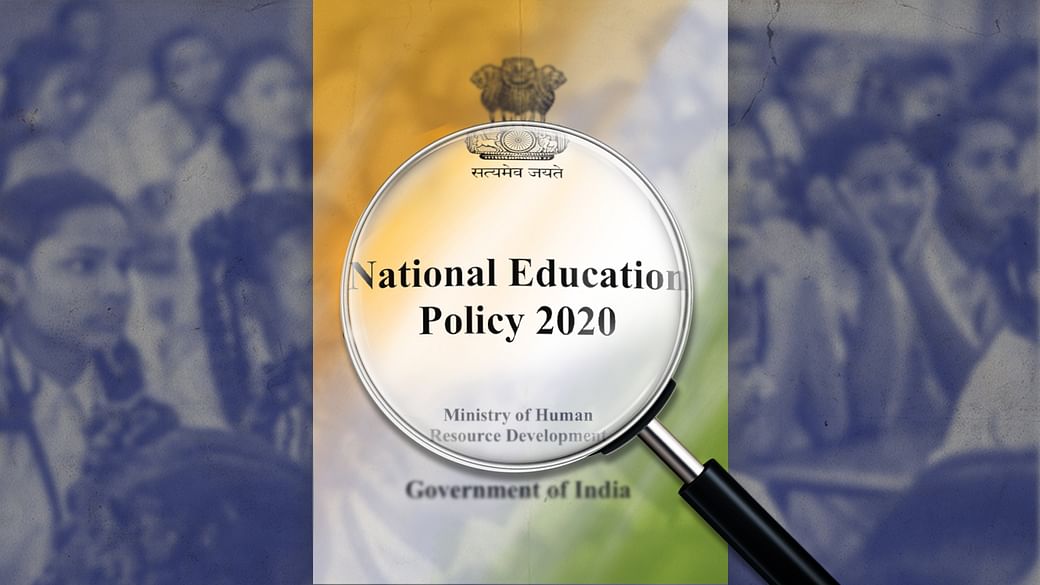
.png) Dr. Frazer Mascarenhas
Dr. Frazer Mascarenhas

The New Education Policy begins with the UN goal of the 2030 Agenda for Sustainable Development, to “ensure inclusive and equitable quality education and promote lifelong learning opportunities for all”. It continues, “Such a lofty goal will require the entire education system to be reconfigured to support and foster learning.” This hasty conclusion shows a total lack of respect for and knowledge of the educational process which is cumulative and gradual. It therefore makes proposals which will be devastating to the educational system in India. The NEP document uses very beautiful language to describe the principles, processes and goals of education but it proposes solutions which will be most damaging to education.
Anti-Constitutional, anti-Minorities
1. No Christian educator was involved in the whole exercise, in spite of Christian educational institutions being among the most sought after and highly rated.
Was there an ulterior motive?
2. No mention of Minority Education Rights at all. A Total eclipse!
What about Art 30 of the Constitution?
3. Under Constitutional values, there is no mention of Secularism – one of the pillars.
This is obviously deliberate. Is this to inaugurate Hindutva?
4. Parallel to removing Constitutional guarantees to Minorities, the reservations for SCs and STs also do not find mention. This cannot but be deliberate.
The Supreme Court had guaranteed that the basic character of the Indian Constitution cannot be changed. The NEP is clearly indicating an intention to change the Constitution in substantive ways.
5. Not content with going so far in its radical changes, the NEP has decided also to remove the present governing structure of Minority Institutions by having no role for the Managing Trustees. Institutions, with their infrastructure and excellent work culture have been built up and maintained over decades. But now:
A School Complex Management Committee (7.7) will run the institutions.
7.8: “The Dept of School Education, through its relevant official, e.g., the BEO, will endorse and confirm the School Complex Development Plan of each school complex”.
In Higher Education, 19.2:“a Board of Governors (BoG) shall be established consisting of a group of highly qualified, competent, and dedicated individuals having proven capabilities and a strong sense of commitment to the institution. There shall be overarching legislation that will supersede any contravening provisions of other earlier legislation and would provide for constitution, appointment, modalities of functioning, rules and regulations, and the roles and responsibilities of the BoG”.
Untested governance structures, consisting of several people with no experience of managing education, will destroy the institutions that people have looked up to for years.
Socio-political Implications
6. A sharing of resources: Human and Material is being envisaged. A school that is better equipped will have to share. Pairing of schools or twinning (one private and one public school) is mandated. However, sharing teachers and infrastructure will cripple a good school, especially if the Governing Board is not controlled by the School’s own Trustees. Isn’t this a refusal to build the necessary infrastructure needed for all
7. Introduction of Samajik Chetna Kendras in the school campus – wouldn’t these be ideology based, controlled by the Government of the day?
21.6: “A key initiative in this direction will be to use schools/ school complexes after school hours and on weekends for adult education courses and for other community engagement and enrichment activities. No control remains over the campus.
8. The emphasis on digital learning, technological solutions, open schools and vocational exits, will leave the girl child, the socially and economically disadvantaged, the differently abled and minority community students without the opportunity for a quality education, interacting with peers in a stimulating, healthy environment of an educational campus.
9. The centralization of creation of content, right from the pre-primary, bodes ill for quality and addressing local needs and conditions. “The responsibility for ECCE curriculum and pedagogy will lie with MHRD.” Centralization also of school assessment through the National Assessment Survey is on the cards. “The National Testing Agency (NTA) will serve as a premier, expert, autonomous testing organisation to conduct entrance examinations for undergraduate and graduate admissions”. TET for every level of Teachers is also mandated. Even recruitment of students at the College level will be centralized. 4.42: “The admission to pre-service teacher preparation programmes shall be through a single nation-wide entrance examination to be conducted by the National Testing Agency.” Such centralization goes against quality of education and against the rights of the States.
Infrastructure and Funding
10 The major changes in stages of education will require massive infrastructure building and recruitment of staff. It is unnecessary to have so many changes in the stages. Forcing children to formal school from the age of 3 is unfortunate. The introduction of the 4 year Bachelor’s Degree, even after the fiasco of the Delhi University experiment is unreasonable. The latter is good only for that 1% of students who would want to go abroad for the Masters: they get the 16 yrs needed. There is very little justification for such structural changes which will cause massive disruption.
11 Funding remains a major problem. The very Government which reduced spending on Education to 2.7% of GDP (admitted by the NEP Draft Document) from an earlier 4%, and which has shown scant resources available even for the States’ share of CGST, will not be able to fund even the minimum needed for the major changes to be effected. Counting on philanthropy is like asking for the moon. Rather, this is a stimulus for the further privatisation and commercialisation of education.
What then is the agenda of the NEP? It does not seem to be an educational agenda, but something more devious.
(Dr. Frazer Mascarenhas S.J. is Former Principal of St Xavier’s College, Mumbai. He can be contacted at frazer@jesuits.net)